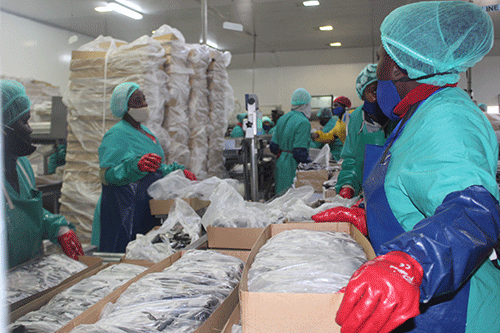Women are regarded as the backbone and pillar of every household. This saying is emulated by the entire fishing industry, where most of the factory jobs are taken up by women.
About 80% of the people employed in the sector are women.
These women spent every day, at least on average seven hours standing in the cold fishing factories to process and pack fish for both local and international markets.
That is their way of providing for their households, despite most not receiving decent salaries.
One such woman is Martha Ambundja, a hardworking mother of three who has been working in the fishing industry for the past 15 years. She says this is a job that does not really pay that well, but has helped her put her three children through school.
“It’s not a high-end job. Besides, I came from Otjimbingwe without any qualifications, so I was lucky to secure a job in the industry,” she notes.
Another employee, Aina Shilongo, says that working in a fishing factory is hard, judging from the fact that one spends most of your days on your feet.
“Our salaries are not that great. However, we have no choice but to work as it pays bills and feeds my family,” says the mother of three.
Nonetheless, she adds that they take pride in their jobs. “We have to make sure that every label and every box that leaves the company is a reflection of our brand.”
Kristina Kastoor, who recently started in the industry after completing school, also told New Era that she has started to appreciate everyone, especially women who spend hours standing to make sure that properly packed fish leave the factories.
“My mother also worked for years in this industry, and I understand the dedication she had. However, I wish that we are also compensated accordingly for our hard work,” Kastoor says.
All women agree that the fishing sector should really start an educational and housing fund for employees.
“We want the companies to really look into our salaries, or set a minimum wage for the industry as this will help us cope with our day-to-day living conditions,” she continues.
The industry employs about 16 000 people in land-based processing factories and at sea. Depending on the number of days the fishing sector employees work in a month, low-level employees in land-based processing factories are paid between N$1 300 and N$4 000.
According to various unions representing fishing industry workers, salaries range from N$900 for contract workers employed in factories, while some permanent workers can get a basic salary of up to N$4 000, and can take home about N$7 000 with overtime and other benefits.
According to the ministry of labour’s executive director, Bro-Mathew Shinguadja, the idea of a minimum wage for the fishing industry was already proposed by the ministry so that stakeholders could collectively come to an agreement that would not only address a minimum wage, but also conditions of employment.
The fishing industry, because of the different sub-sectors, negotiates wages directly with unions.
“We also want a minimum wage for the industry, and have given them the idea already. But we cannot prescribe it to them as they collectively have to discuss and come up with one,” he states.


